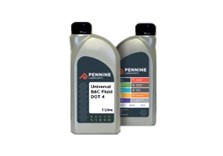The brakes on the Leyland middleweight range of tractors is a topic that I could write about for hours. Firstly, it is something that I feel very strongly should be high up on every tractor owners priority list. They are so important, so often I hear that people don't bother with maintenance and almost boast about how bad their brakes are, you won't be saying that when somebody has been hurt.
The brakes on a Leyland middleweight tractor (Leyland 245, 253, 255, 270, 262, 272, 282, 462, 472 and 482) are cheap and relatively easy to maintain as you do not have to remove the rear wheel in order to get to the brake housing (of course you can remove the wheel to make it easier for you, but you do not HAVE to).
Secondly, the dry brake system on the Leyland middleweight tractors has a really bad reputation, which is not entirely justified. Yes the rivals to the Leyland tractors may have had a slightly better system going, and Leyland did make the move to a wet brake system by the time the Harvest Gold range of Marshall tractors hit production, but the brakes on the blue Leylands are made to a pretty good standard.
The first blog in this series on brakes looked at the brake discs and the brake actuators, this blog will look at the fluid system of the braking system on the Leyland middleweight tractors as well as what fluid to use in your clutch and brake systems.
What Fluid To Use?
We often get phone calls asking which brake fluid to use on the Leyland tractors. Is it synthetic or mineral based clutch and brake fluid? Dot 3? Dot 4? Well, I can tell you that you should only ever use Dot 4 fluid in the clutch and brake systems of a Leyland tractor. Dot 4 brake and clutch fluid is a fully synthetic brake and clutch fluid. Dot 4, I believe, has a slightly higher boiling point, and also absorbs less water than Dot 3, making it the better choice.
Here at Tractor Spare Parts Ltd, we use Pennine lubricant oils and we recommend their DOT 4 clutch and brake fluid too. We use this in the restorations and repair jobs that come through our workshop, as well as in our own tractors. Tried and tested!

The seals in the master cylinders and the slave cylinder are designed for the Dot 4 fluid, it is not mineral based fluid. If the wrong fluid is put into the braking system of the Leyland tractor, then the seals will swell and they will perish, causing them to fail. This is due to the differences in the salts in the fluid causing the rubber to change characteristics.
The job of the clutch and brake fluid is to make you stop as soon as you press on the brake pedal, and bring you safely to a stop; or to disengage the clutch pedal as soon as you press the clutch pedal down. It transfers the motion of the pedal to the brakes or clutch to make them work properly. Therefore, one of its greatest properties is that it does not compress under pressure.
One of the problems is that clutch and brake fluid is hygroscopic. This means that it absorbs water from the air that permeates through rubber hoses, seals and through fittings and joints. The problem with this, is that brake fluid has a finite lifetime, and therefore it should be changed routinely as part of a regular maintenance schedule.
When the brake fluid has absorbed water, it has two effects:
- The brake fluid itself becomes easily compressed, meaning that it is less efficient.
- The water is now flowing through the brake or clutch system and can cause corrosion of the cylinders, and metal brake pipes causing them to rust from the inside out. Not desirable as from the outside where we can visually inspect them they may look fine and they therefore may go unnoticed.
Dot 4 brake fluid when new is a light straw colour, but it becomes darker as it absorbs water, if it gets contaminated with debris from the internal seals, or rust from the pipes etc.
So it is very important to replace the brake fluid regularly as part of a maintenance schedule, even if your vintage Leyland tractor does not put many hours on the clock during the year. It is recommended by the manufacturers that brake fluid is replaced every 2 years.
Sorry To Ramble On
Well I did not plan on going on for so long about the intricacies of Dot 4 clutch and brake fluid, but there we go. I think there will have to be a Part 3, which will focus on the master cylinders and slave cylinders of the braking system and how these need to be right.
It is a very cold January and it will be going dark soon, so I am going to check the animals water to see if it need re-thawing out and I will come back later and do a Part 3 of the braking systems on the Leyland tractors.





